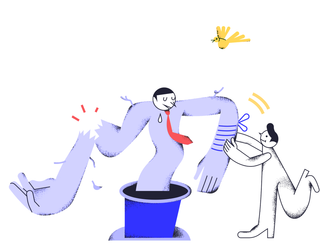Being in charge of a team gives you a lot of energy, which originates both from people you work with and challenges you face. However, there comes the day when good vibes, coming from your
teammates (even the best ones), are replaced by a bitter taste of apathy and indifference. If you’re seeing this, then you’ve most likely run into a wall of demotivation.
Yes, from time to time, employees become demotivated, and you have to find ways to raise their morale. In this blog post, we explore the signs, causes and dangers of demotivation, and 8 easy ways to improve the team spirit.

Know your enemy: what causes demotivation?
There are multiple factors that cause workplace demotivation. The key reason so far is the relationship between managers and their teams. As seen from the suggested points below, this is the biggest root cause of this transformation driving the people’s morale down.
Feeling undervalued and useless
Your teammates always want to know that their efforts are valued and recognised. When they’re consistently performing and get no appreciation or recognition, employees start wondering, “what’s that all about”, nobody cares and notices anyway.

Working without purpose
Living without goals or intent may be the biggest reason to feel demotivated. No purpose means no sense of direction, when things are done just for the sake of doing things, instead of working towards something desirable. This sense of direction often comes from a company vision. If your employees do not connect to the vision, they will not understand how they contribute to reaching it.
Personal circumstances
There’s a life outside work, and there are innumerable events that can happen and impact a employees’ behaviour. Never expect that everyone will share their problems openly at workplace.
Goals are too big
Your goals can also be a source of your current motivation problem. If they’re too large and vague, this might likely create the unrealistic workload that your employees will not handle. The excessive workload along with expecting too much from the team cause frustration and anxiety and can negatively affect the well-being and health of your employees.
Broken trust level
Lack of trust decreases the speed and productivity of the team and increases the costs. Trust level breaks if a manager fails to keep his promises and commitments, which apply to promotion or other promised benefits, including advance of wages. If you are not delegating tasks because you believe only you can do them correctly, communicates a lack of trust as well.

Poor time management can cause a wide range of problems such as inefficient time allocation, distraction and procrastination. Employees who don’t have control over their time end up letting tasks sit until the last minute, a lot of stress when they try to play catch up and finally miss the deadlines entirely.
No development or/and career opportunities
Most employees are eager to develop, learn and grow. However, the opportunities to develop skills and expertise may be missing, which causes a team member to feel frustrated as he knows that he could have bring more value to the team.
Absence of career opportunities shadows the motivation and profession goals of your teammates. If a team leader doesn’t show the way their efforts can affect their career pump, this will definitely lead to demotivation.
Dangers: what is the impact of a demotivated employee?
There’s one more thing you should consider if/when facing the problem. The demotivated employees are often distracted, and they start distracting and frustrating those around them affecting negatively the general working atmosphere inside the team. If they have a client-facing position, then the problem may have a killing impact on your relationship with both the existing and potential customers.

“Fixing the bugs”: 8 steps to motivate your employees
After you realized that the lack of motivation is what’s haunting your team’s productivity and success, you have to re-energise the employee before the situation escalates into a bigger problem. To create an environment where your team members feel and work in comfort, follow these suggestions and see those demotivated team members become engaged and productive once again.
1. Investigate the problem
When you encounter a considerable demotivation problem, get to know the reasons. Carry out an anonymous survey or assemble a focus group to receive a feedback about conditions that are driving the spirit down. Don’t hesitate to ask pointed questions and encourage honest answers that may help to determine the problem areas. Also ask HR for potential solutions that could improve workplace conditions and increase morale.
2. Get involved
Take proactive steps based on the information you’ve found. Investigate the issues that affect workplace motivation and think of the actions that will help to resolve the problem. This will result in achieving tangible improvements and addressing team’s direct concerns.
3. Make every team member feel important
Take proactive steps Remind your employees about the reasons you’ve hired them — their skills and knowledge. Show them, that you do appreciate their input to the company’ development and the team’s progress. You can also make up some traditions that you and your employees will keep. If your corporate culture allows informal crew meetings then choose a weekend to go out and have a chat with the team.
Learn to respect your teammates’ personalities: listen to their ideas and fails, share your thoughts and take theirs into account. Make them feel involved in business processes and, most important, show your people you treat them equally. on the information you’ve found. Investigate the issues that affect workplace motivation and think of the actions that will help to resolve the problem. This will result in achieving tangible improvements and addressing team’s direct concerns.
4. Be technology-driven
Introduce new tools to set up proper time management. A time tracking app is an essential time management tool that can help you and your team become more organized, efficient, and get more things done.
Time tracker is a simple-to-use app that combines two crucial features — project management and productivity analysis. Additionally, time tracker is designed to help managers and their teams identify their unproductive habits and eliminate distraction. In fact, this tool doesn’t just tell you how long you’ve spent working, but how long you’ve been productive.
5. Create development opportunities
Work with each team member to create opportunities outside their day-to-day role. It really matters for an employee to see that a manager cares about his career and tries to find where they can develop their knowledge and learn new skills. Mentoring, coaching, suggesting additional training or coursework — all of these can be helpful and highly valued. This will also allow to delegate and create new development opportunities for yourself.
6. Keep on talking
Have a conversation with your demotivated team members. Share the behaviours that you have noticed that are different to how they usually are and give them the opportunity to explore what the underlying cause is. Maybe they want some autonomy or want to feel in control. Communicate your expectations, let them know what the desired goal is and then give them the space to go and achieve it.
7. Reward and encourage
Dealing with budgeting is hard. Yet, if there’s a need to increase your team members wages, think of budgetary reallocations. Analyze the expenses and optimize the resources. Reward brilliant and helpful ideas from your employees. Offer encouragement for the upcoming successes or rally the team by providing non-tangible benefits, like flex time or additional time off.
8. Monitor Morale Levels
Finally, implement various morale-building programs or spirit-lifting team initiatives. These may be employee appreciation plans and company/team awards. Celebrate birthdays, acknowledge even small contributions and encourage staffers to continually submit ideas for how to improve the overall workplace dynamic. Regularly ask for feedback to help maintain morale.

Keep in mind
Even the best employees become demotivated but it is necessary to get back their drive to push forward. These 8 points above will help you to find the reasons behind your lack of motivation and the next steps you need to take to recover that drive and passion. Follow simple rules to handle the demotivation problem and never forget to:
1. Identify and evaluate the reasons
2. Talk, discuss and get a feedback to find the best solution
3. Introduce new methods, techniques, technologies, tools and solutions
4. Pay attention and monitor morale levels to prevent demotivation problem
Keep this in mind and don’t forget to subscribe to our social media to get more tips on the project management and human resources.
